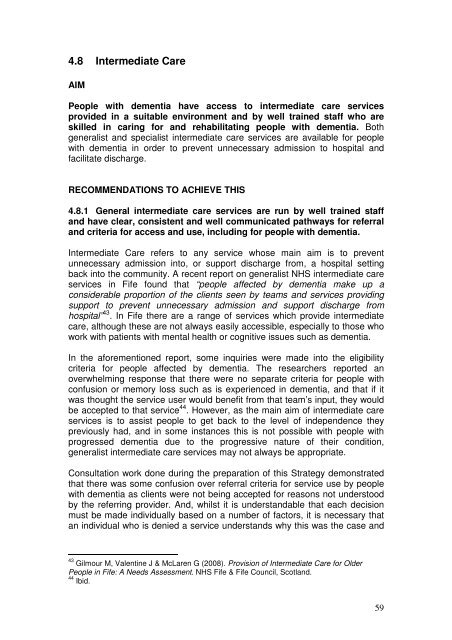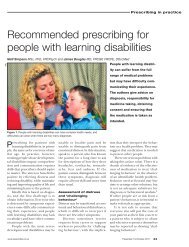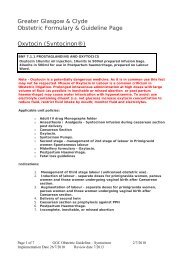The Fife Dementia Strategy: 2010 â 2020 - The Knowledge Network
The Fife Dementia Strategy: 2010 â 2020 - The Knowledge Network
The Fife Dementia Strategy: 2010 â 2020 - The Knowledge Network
Create successful ePaper yourself
Turn your PDF publications into a flip-book with our unique Google optimized e-Paper software.
4.8 Intermediate Care<br />
AIM<br />
People with dementia have access to intermediate care services<br />
provided in a suitable environment and by well trained staff who are<br />
skilled in caring for and rehabilitating people with dementia. Both<br />
generalist and specialist intermediate care services are available for people<br />
with dementia in order to prevent unnecessary admission to hospital and<br />
facilitate discharge.<br />
RECOMMENDATIONS TO ACHIEVE THIS<br />
4.8.1 General intermediate care services are run by well trained staff<br />
and have clear, consistent and well communicated pathways for referral<br />
and criteria for access and use, including for people with dementia.<br />
Intermediate Care refers to any service whose main aim is to prevent<br />
unnecessary admission into, or support discharge from, a hospital setting<br />
back into the community. A recent report on generalist NHS intermediate care<br />
services in <strong>Fife</strong> found that “people affected by dementia make up a<br />
considerable proportion of the clients seen by teams and services providing<br />
support to prevent unnecessary admission and support discharge from<br />
hospital” 43 . In <strong>Fife</strong> there are a range of services which provide intermediate<br />
care, although these are not always easily accessible, especially to those who<br />
work with patients with mental health or cognitive issues such as dementia.<br />
In the aforementioned report, some inquiries were made into the eligibility<br />
criteria for people affected by dementia. <strong>The</strong> researchers reported an<br />
overwhelming response that there were no separate criteria for people with<br />
confusion or memory loss such as is experienced in dementia, and that if it<br />
was thought the service user would benefit from that team’s input, they would<br />
be accepted to that service 44 . However, as the main aim of intermediate care<br />
services is to assist people to get back to the level of independence they<br />
previously had, and in some instances this is not possible with people with<br />
progressed dementia due to the progressive nature of their condition,<br />
generalist intermediate care services may not always be appropriate.<br />
Consultation work done during the preparation of this <strong>Strategy</strong> demonstrated<br />
that there was some confusion over referral criteria for service use by people<br />
with dementia as clients were not being accepted for reasons not understood<br />
by the referring provider. And, whilst it is understandable that each decision<br />
must be made individually based on a number of factors, it is necessary that<br />
an individual who is denied a service understands why this was the case and<br />
43 Gilmour M, Valentine J & McLaren G (2008). Provision of Intermediate Care for Older<br />
People in <strong>Fife</strong>: A Needs Assessment. NHS <strong>Fife</strong> & <strong>Fife</strong> Council, Scotland.<br />
44 Ibid.<br />
59
















